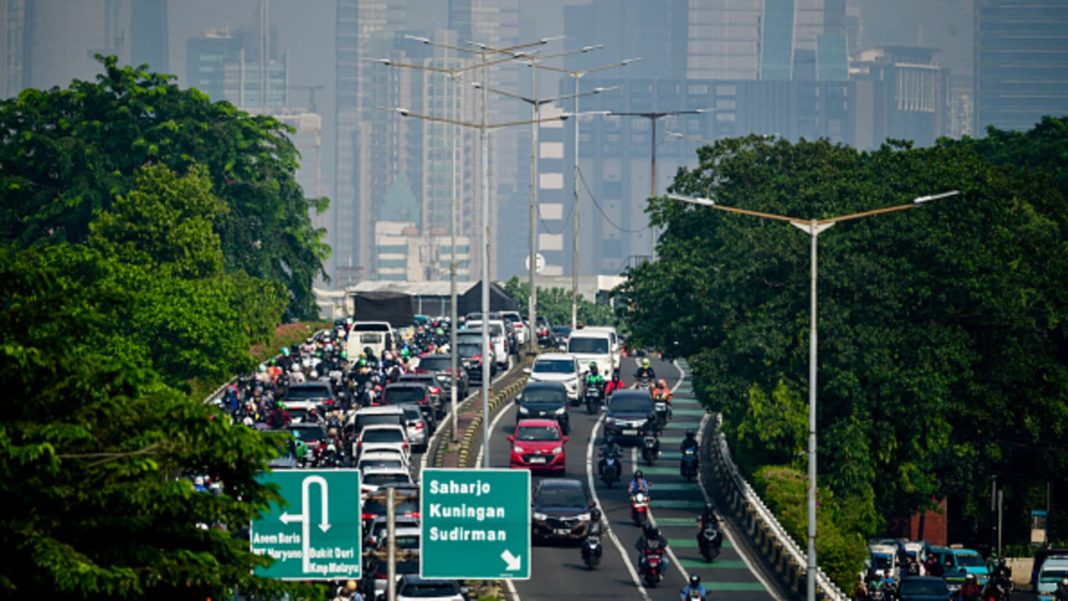This photo shows a general view of a traffic jam on a main roads leading into the city center of Jakarta on May 8, 2024 as thin haze of pollution sits over the city’s skyline.
Bay Ismoyo | Afp | Getty Images
Indonesia’s rise as an emerging economy is the latest of Asia’s success stories.
Yet the country’s Finance Minister Sri Mulyani Indrawati has warned that its yearly 5% GDP growth, higher than the global average of 2%, is “not enough for [Indonesia] to achieve the meaningful progress” needed to become a high-income nation.Â
Indonesia’s ambition is part of what it calls the “Golden Vision 2045,” a grand plan aimed at transforming the country into a skilled workforce on high wages and a way to reduce poverty rates by the time it celebrates its 100-year anniversary.  Â
“To continue our journey [as a middle-income country aspiring to be a high-income country] … of high growth based on high productivity, we have to invest more in human capital,” the finance minister told CNBC’s “Squawk Box Asia” in an interview broadcast last week.Â
A country report by the International Monetary Fund published in August underlined that the aspiration for Indonesia is to “increase value added by moving through the value chain from raw commodities, build a skilled population ready for the digital age, and accelerate infrastructure development and institutional reform to support balanced, green, and equitable growth.”
Despite a change in political power earlier this year, Indonesia’s ambitions remain. More than 200 million voters in the world’s most populous Muslim country went to the polling booths in February, ending a decade of President Joko Widodo at the helm with the election of former army general and Defense Minister Prabowo Subianto.Â
The new administration will take charge in October for a five-year term. Incoming President Subianto has promised to continue the charge toward making Indonesia a high-income economy. Â
Economic reforms passed through by the outgoing president will make the achieving Indonesia’s grand vision easier. Â
“Widodo put in place a bunch of economic reforms, the most noticeable being making it easier to hire and fire new workers. And they also reformed land use rights,” Gareth Leather, a senior economist at Capital Economics, told CNBC. Â
“Indonesia still does a few things wrong. Infrastructure is not great. Corruption is still a problem. But they’re heading in the right direction,” he said. Â
Indrawati hopes to avoid “the middle-income trap” â an economic development situation where growing economies stagnate at middle-income levels and are unable to advance to the ranks of high-income countries. Major policy reforms, she believes, will help Indonesia sidestep that. “A lot of government efforts, including our fiscal budget, are allocated significantly for education, health and [the] social safety net,” she said.
The IMF’s findings fall in line with the finance minister. The Washington-based institution said achieving high-income status will require “broad and sustained structural” reforms, while also securing the economic stability that has already been built up.
A report published in July by the Lowy Institute, an Australian-based business think tank, noted the gains that have already been achieved, stating that the country’s digitalization of social welfare programs, as well as subsidized food and energy initiatives, have “coincided with a significant reduction in poverty, with less than 10% of the country’s 279 million residents living below the international poverty line by 2023.”
‘Won’t ever be the next China’
Taxation and labor reforms, making it easier for firms to hire and fire workers, are also a strategic part of Indonesia’s economic engineering.Â
“They’re useful steps in the right direction,” said Leather. Â
“Under the old system, if you wanted to sack a worker in Indonesia, you had to pay them up to 60 weeks of severance pay. Which is way more than anywhere else. If you’re a manufacturing investor looking at where to set up shop in Asia, and you see how inflexible the labor force is, it could put you off.” Â

Leather feels “relatively upbeat about Indonesia,” though “it won’t ever be the next China,” he told CNBC. “If it continues growing at 5-6% over the next decade, that’s a decent performance,” he added.Â
Indrawati, meanwhile, remains cautious.Â
“A lot of work still needs to be done,” said the minister, adding that a lot had been achieved “despite Covid and geopolitical fragmentation.”Â
A key goal is for Indonesia to remain politically non-aligned through its economic policy, despite growing pressures of war in Ukraine and Gaza. “Despite geopolitical tensions and fragmentation, Indonesia can nurture its domestic [growth]” and must be “opportunistic” in increasing demand within the chip industry and electric vehicle battery production, said the finance minister.


